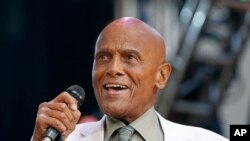Belafonte died Tuesday of congestive heart failure at his New York home, his wife Pamela by his side, said Ken Sunshine, of public relations firm Sunshine Sachs Morgan & Lylis.
With his glowing, handsome face and silky-husky voice, Belafonte was one of the first Black performers to gain a wide following on film and to sell a million records as a singer; many still know him for his signature hit "Banana Boat Song" and its call of “Day-O! Daaaaay-O.”
But he forged a greater legacy once he scaled back his performing career in the 1960s and lived out his hero Paul Robeson’s decree that artists are “gatekeepers of truth.”
He stands as the model and the epitome of the celebrity activist.
Belafonte not only participated in protest marches and benefit concerts, but helped organize and raise support for them. He worked closely with his friend and generational peer the Rev. Martin Luther King Jr., often intervening on his behalf with both politicians and fellow entertainers and helping him financially.
Belafonte’s friend, civil rights leader Andrew Young, would note that Belafonte was the rare person to grow more radical with age.
He was ever engaged and unyielding, willing to take on Southern segregationists, Northern liberals, the billionaire Koch brothers and the country’s first Black president, Barack Obama, whom Belafonte would remember asking to cut him “some slack.”
Belafonte responded, “What makes you think that’s not what I’ve been doing?”
He mentored South African singer and activist Miriam Makeba and helped introduce her to American audiences, the two winning a Grammy in 1964 for the concert record “An Evening With Belafonte/Makeba.”
He coordinated Nelson Mandela’s first visit to the U.S. since being released from prison in 1990.
A few years earlier, he initiated the all-star, million-selling “We Are the World” recording, the Grammy-winning charity song for famine relief in Africa.
Harry Belafonte was born Harold George Bellanfanti Jr. in 1927, in a community of West Indians in Harlem. His father was a seaman and cook with Dutch and Jamaican ancestry and his mother, part Scottish, worked as a domestic. Both parents were undocumented immigrants and Belafonte recalled living “an underground life, as criminals of a sort, on the run.″
He was married three times, most recently to photographer Pamela Frank, and had four children. Three of them — Shari, David and Gina — became actors.
Mindful to the end that he grew up in poverty, Belafonte did not think of himself as an artist who became an activist, but an activist who happened to be an artist.
“When you grow up, son,″ Belafonte remembered his mother telling him, “never go to bed at night knowing that there was something you could have done during the day to strike a blow against injustice and you didn’t do it.″




